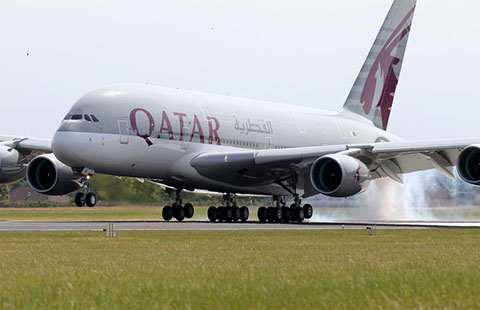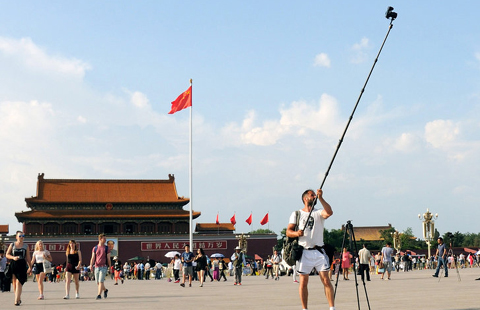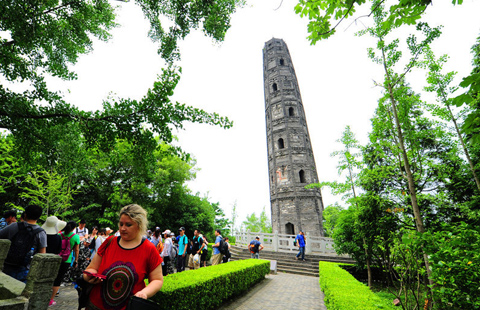Checks on imported food to get tougher
Updated: 2015-06-16 07:43
By Shan Juan(China Daily)
|
|||||||||
Laws to reflect changes as Chinese buy more from abroad after domestic scandals
The food quality watchdog is set to further strengthen the regulation of imported foods, which are growing more popular following a series of food safety scandals in China.
Lin Wei, director of the Imported Food Safety Bureau of the General Administration of Quality Supervision, Inspection and Quarantine, revealed the initiative on Monday at the opening ceremony of the 2015 National Food Safety Awareness Week.
"The administration will further improve safety regulation of imported food by setting up risk management and assessment systems and improving a whole-process surveillance mechanism," he said.
These improvements will also be represented in the recently revised Food Safety Law of China, he added, but he did not give further details.
A survey by the China Food and Drug Administration in March found that nearly 75 percent of respondents didn't have any or enough confidence in domestic food safety.
Of all the food safety crises last year, an international one involving Shanghai Husi Food, owned by the Chinese arm of US food giant OSI Group, attracted the most public attention.
The company was found supplying expired meat to fast-food outlets including McDonald's and Yum Brands in many parts of the country.
"The food supply chain is becoming more globalized, so we face common, more-complicated challenges to ensure food safety," said Sun Baoguo, academician of the Chinese Academy of Engineering and president of Beijing Technology and Business University.
"China definitely needs to further improve its food safety, but the concern and risk also touches imported food items," he said.
He urged China's food safety authorities to bolster regulation of imported food along with their long-term efforts to ensure domestic food safety.
Currently, the General Administration of Quality Supervision, Inspection and Quarantine conducts quality inspections of imported food.
In the first five months of the year, the administration screened out 927 shipments of substandard or problem imported food items, worth $12.7 million, according to Lin.
They were from 79 countries and regions and included drinks, baked goods, candy, dairy products, liquors and dried nuts, he said.
Major problems include food additive usage and microorganism contamination, and he emphasized that problem food is returned or destroyed.
Previously, the CFDA disclosed plans to dispatch food and drug inspectors to the United States. However, that has not been implemented due to problems such as staff shortages.
The US Food and Drug Administration, in a similar vein, unveiled plans last year to boost the size of its office in China to conduct more inspections of food exports to the US.
shanjuan@chinadaily.com.cn
(China Daily 06/16/2015 page4)

 Hainan San Jose to Beijing: Ready for take-off
Hainan San Jose to Beijing: Ready for take-off
 Trending Across China: A Porsche gilded in gold
Trending Across China: A Porsche gilded in gold
 Paris Air Show: From Bombardier's new C Series to China Airlines
Paris Air Show: From Bombardier's new C Series to China Airlines
 Warriors move within one win of NBA title
Warriors move within one win of NBA title
 Ten photos you don't wanna miss - weekend special
Ten photos you don't wanna miss - weekend special
 Shanghai's leaning pagoda beats the Leaning Tower of Pisa
Shanghai's leaning pagoda beats the Leaning Tower of Pisa
 Top 10 luxury houses in the world
Top 10 luxury houses in the world
 18th Shanghai Int'l Film Festival kicks off
18th Shanghai Int'l Film Festival kicks off
Most Viewed
Editor's Picks

|

|

|

|

|

|
Today's Top News
China, US to kick off key talks next week
China, US sign agreement to boost army cooperation
City honors slain NYPD
Detective Liu
Chinese students on trial in alleged torture of peer
Alibaba to launch Netflix-like video streaming service
Spacecraft that landed on comet finally wakes up
Former Chinese top legislator Qiao Shi dies in Beijing at age 91
China has adequate fiscal space to absorb local govt debt risks
US Weekly

|

|







